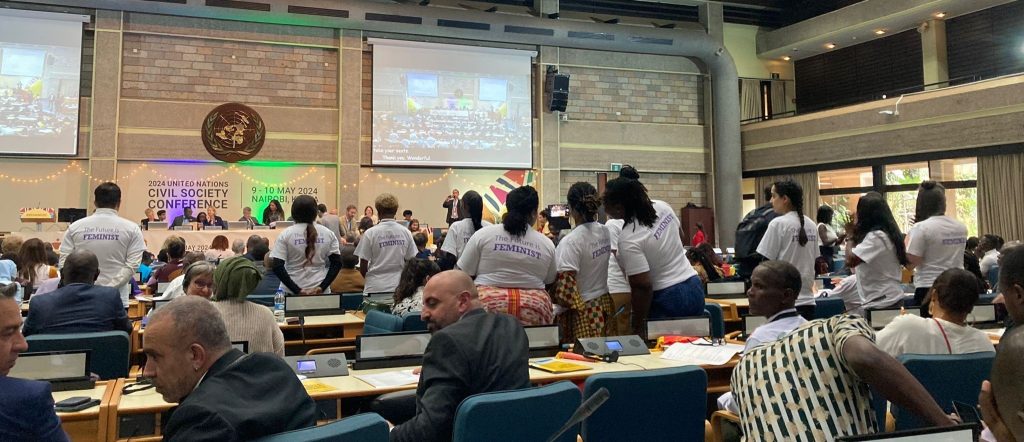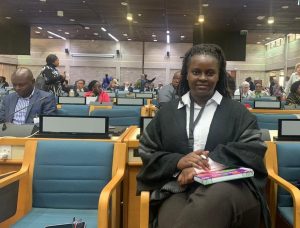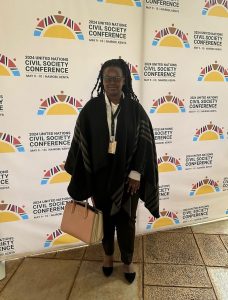UN Civil Society Conference: Improvements in youth representation but lacking SRHR
 27 May 2024
27 May 2024

As a youth representative from Kenya, I was delighted to recently attend the 2024 UN Civil Society Conference (UN CSC) in Nairobi, Kenya. The conference brings together civil society organisations, as well as youth changemakers, policymakers, the media and academics, to discuss the pressing issues of our time. The UN CSC acts as a precursor to the Summit of the Future, a UN summit taking place in September 2024 with countries committing to action on key issues. These actions will be documented in three key documents: the ‘Pact for the Future’, ‘Declarations on Future Generations and the ‘Global Digital Compact’.
While attending the UN CSC, I represented Make Way, advocating for sexual and reproductive health and rights (SRHR) and meaningful youth engagement. This year’s conference saw an increase in youth representation – a key step forward in ensuring young people are active players in decision-making, processes, policies and more. Nonetheless, a concerning development was the lack of discussion and actions around health and SRHR. While I welcome the greater involvement of young people at the conference, it remains paramount that SRHR remains a topic on the table, particularly with it under threat around the world. All individuals, including people who are minoritised, should be able to realise their SRHR.
Did you know?
Summit of the Future
The Summit of the Future is a high-level event in September 2024 bringing together world leaders to strengthen international cooperation, address gaps and reaffirm existing commitments on the key issues of our time. The outcome document of the Summit of the Future will be the ‘Pact for the Future’. The UN Civil Society Conference acted as a precursor to the Summit of the Future.Pact for the Future
The ‘Pact for the Future’ is an action-oriented outcome document from the Summit of the Future that will be endorsed by world leaders. The Pact focuses on five key areas:
- Sustainable development and financing for development
- International peace and security
- Science, technology and innovation and digital cooperation
- Youth and future generations
- Transforming global governance.
The Pact of the Future will also be supported by two annexes: the ‘Declaration on Future Generations’ and the ‘Global Digital Compact’.
Declaration on Future Generations
The ‘Declaration on Future Generations’ is a document consolidating countries and other stakeholders commitments to account for the interests of future generations in national and global decision making.
Global Digital Compact
The ‘Global Digital Compact’ is “an inclusive global framework to overcome digital, data and innovation divides.” The compact strives to ensure digital technologies, such as the Internet and AI, are human rights-based, open, free and secure for all.
 Leading up to the conference
Leading up to the conference
I attended two pre-conferences before the United Nations Civil Society Conference; one organised by Akina Mama wa Afrika, where we discussed the ‘Pact for the Future Zero Draft’ and its lack of acknowledgement of gender inequality and health. I also met Johanna (Yoka) Brandt, who is the Permanent Representative of the Kingdom of the Netherlands to the United Nations in New York, at the Dutch Embassy in Kenya. We discussed, together with other civil society actors from the Dutch Ministry of Foreign Affairs funded programmes, the importance of meaningful youth engagement in decision making.
SRHR lacking, yet health-focused organisations still paving the way
During the UN Civil Society Conference, sexual and reproductive health and rights were unfortunately glossed over in the three key documents being discussed – the ‘Pact for the Future’, ‘Declarations on Future Generations and the ‘Global Digital Compact’. In fact, health overall was not included as a major issue in the ‘Zero Draft for the Pact for the Future’. The positive outcome from this conference is that from global health focused organisations, there were a lot of deliberations on the weakness of the Zero Draft on health issues and the complete lack of mention of health in the ‘Global Digital Compact Zero Draft’. Another great impact was the approval by the organisers of the UNCSC 2024 of the Health ImPACT coalition! The Health ImPACT coalition is a civil society led coalition of stakeholders in health, who are working towards advancing health as a priority issue in the lead up to the Summit of the Future in September 2024 and beyond. The organizers for the Health ImPACT coalition are: WACI Health, STOPAIDS, Global Network of People Living with HIV (GNP+), ITPC Global, Frontline AIDS and Global Fund Advocates Network (GFAN). Sexual and reproductive health and rights will feature in this Health ImPACT coalition and we look forward to discussions on that.
 Youth stepping up
Youth stepping up
Youth representation at the summit was about 40%. The UN CSC 2024 really pushed to have youth attend and I am glad that the representation went up. Youth representation in the summit is paramount to ensuring young people are not only reflected, but also an active player in processes, policies and more when it comes to acting on today’s most urgent issues, as well as in the formation and implementation of the ‘Pact for the Future’. Key issues facing young people, such as SRHR, meaningful youth engagement and gender equality need to remain on the table at key conferences so that we can continue to advocate in all our diversities on the issues impacting us. It was a shame not to see some of these topics present during the UN CSC, but it was good as a youth advocate to address some of the topics, and I would love to keep contributing beyond this conference.
Intersectionality
Global advocacy summits such as the now concluded UN Civil Society Conference should strive to understand intersectionality and promote diversity and inclusion in these spaces. Intersectionality ensures that everyone is represented and that their voices are heard. It was good to see intersectionality discussed in some workshops, for example, ‘Successes and Barriers of Meaningful Youth Engagement: From ECOSOC Youth Forum to the Summit of the Future’ and ‘Social Summit and Reimagining Development: Reclaiming the Dignity of African Women and Girls’. However, whether it will be captured in the final version of the ‘Pact for the Future’ is yet to be determined. Beyond the workshops, one of the other intersectional factors that really stood out to me at this conference was the large attendance of young people and people from marginalised communities. This was made possible because of the location of the conference in the Global South in Kenya – the first UN CSC held in the Global South. More people from Africa and the Global South were able to attend because it was relatively cheaper and easier to attend than other conferences organised in places such as New York, which can be very expensive and inaccessible due to visa restrictions that limit (youth) participation.
The Power of Advocacy
My overall learning at this conference was the power of advocacy. At the conference, we had a silent protest dubbed “Not our Pact; The Future is Feminist”, with the aim to raise awareness on the discrepancies on the ‘Pact of the Future Zero Draft’, particularly on gender equality and health. The protest was recognised by the convener and we were glad to raise awareness through our advocacy. The gains of the newly formed Health ImPACT Coalition are also commendable, where we strive to keep fighting for the inclusion of health and SRHR within the ‘Pact for the Future’.



